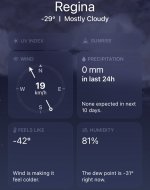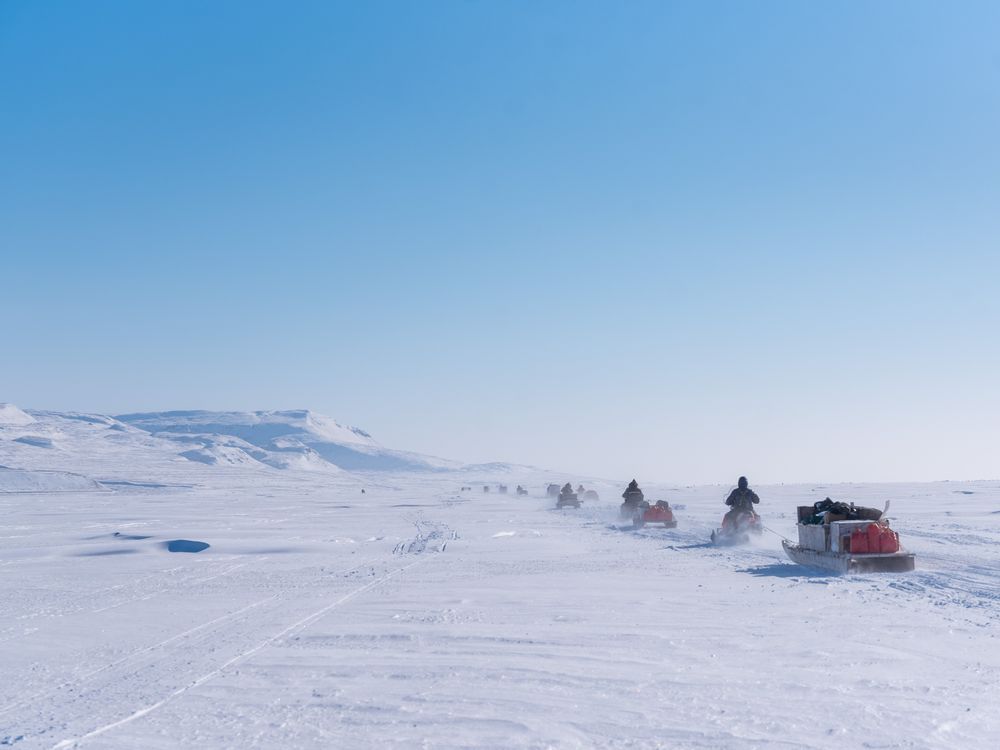Looks like that dry kind of cold . Good luck .
It's Climate Change I tell'ya!! IT'S CLIMATE CHANGE!!
- Thread starter B00Mer
- Start date
You are using an out of date browser. It may not display this or other websites correctly.
You should upgrade or use an alternative browser.
You should upgrade or use an alternative browser.
That’s global warming. We must pay our carbon taxes!!Windchill was -50°.
Its gotten hotter by 1°
The cold winter months are proof of climate change they tell me .That’s global warming. We must pay our carbon taxes!!
I can't believe it is cold in Saskatchewan in the winter. Who would have guessed that?
Not Greta Thunberg.I can't believe it is cold in Saskatchewan in the winter. Who would have guessed that?
I can't believe it is cold in Saskatchewan in the winter. Who would have guessed that?
So explain why it's 7 in my region and rain/wet, when it SHOULD be snow on the ground and under 0? Or at least, historically; this is more a common thing in the past dozen or more years...
You're right - a whole 7 degree variance over historical averages couldn't possibly be explained by just being part of a normal range - it MUST be global warming!!!!! Or aliens. It might be aliens.So explain why it's 7 in my region and rain/wet, when it SHOULD be snow on the ground and under 0? Or at least, historically; this is more a common thing in the past dozen or more years...
I’ll trade you.So explain why it's 7 in my region and rain/wet, when it SHOULD be snow on the ground and under 0? Or at least, historically; this is more a common thing in the past dozen or more years...
I’ll trade you.
That's real sweet of you Ron, but I wouldn't want to put that kind of pressure on you
Serious, Saskatchewan is generous that way. Maybe we can just average our weather with yours and call it…whatever you want to call it…as long as we’re not punitively taxed for it.That's real sweet of you Ron, but I wouldn't want to put that kind of pressure on you
Serious, Saskatchewan is generous that way. Maybe we can just average our weather with yours and call it…whatever you want to call it…as long as we’re not punitively taxed for it.
Sure, works for me. Though I find as I get older, cold is not good to be. So having it be 7 out IS rather nice despite how wrong it is.
Ditto, & Ditto. Place south of me an hour (Weyburn) broke a cold record this morning at -49.Something degrees Celsius. Good times. Global Changey-Stuff.Sure, works for me. Though I find as I get older, cold is not good to be. So having it be 7 out IS rather nice despite how wrong it is.
Last time I was in Calgary in that kind of cold the radio was warning of hypothermia within 5 minutes without proper attire .Ditto, & Ditto. Place south of me an hour (Weyburn) broke a cold record this morning at -49.Something degrees Celsius. Good times. Global Changey-Stuff.
Ditto, & Ditto. Place south of me an hour (Weyburn) broke a cold record this morning at -49.Something degrees Celsius. Good times. Global Changey-Stuff.
Nope, nope, nope and lots more nope. Too goddamn cold!
The thing here is that it's not the same cold we used to have; it's wetter/damp cold which is worse. Throw that with winds that seem to happen more often and it's horrible.
Try wind chill in the -40°C range with more than 80% humidity….but “at least it’s a dry cold” sort’a bullshit…and I’m describing this morning. I do have empathy with what you’re describing, as the cold months here are January & February.Nope, nope, nope and lots more nope. Too goddamn cold!
The thing here is that it's not the same cold we used to have; it's wetter/damp cold which is worse. Throw that with winds that seem to happen more often and it's horrible.

Its called weather. Just like the weather that set record lows on the Prairies the last few days.So explain why it's 7 in my region and rain/wet, when it SHOULD be snow on the ground and under 0? Or at least, historically; this is more a common thing in the past dozen or more years...
New report details effects of changing Arctic climate
Author of the article:Canadian Press
Canadian Press
Emily Blake
Published Dec 13, 2022 • 2 minute read
YELLOWKNIFE — A new report details how widespread changes in the Arctic, from warming air temperatures to sea-ice loss, have affected animals, plants and people living there.
The National Oceanic and Atmospheric Administration released its latest annual Arctic report card Tuesday, complied by more than 100 experts from 11 countries. It provides an update on vital signs in the region and includes new chapters on precipitation, the impacts of rapid climate change on Indigenous communities and the need for more research on pollinators.
The report reinforces long-term trends but also noted regional differences. Among its major findings were that Arctic surface air temperatures between October 2021 and September 2022 were the sixth warmest on record since 1900, and conditions were wetter than normal, with precipitation increasing significantly since the 1950s. The report also noted lower-than-average sea-ice coverage, increased ocean plankton blooms and the 25th consecutive year of Greenland ice sheet loss.
“Few parts of the world demonstrate such extreme seasonal shifts in temperature, land and ocean cover, ecological processes, and wildlife movement and behaviour as the Arctic,” said the report.
“These extreme shifts across the annual cycle are a source of the Arctic region’s heightened sensitivity to climate changes and to climate-related disturbances.”
Lawrence Mudryk, a scientist with Environment and Climate Change Canada, was the lead author of the chapter on terrestrial snow cover. He said, overall, the report shows the seasons are shifting in the Arctic and there have been several disturbances due to, or worsened by, climate change, such as storms and extreme weather.
“It sometimes gets a little overwhelming to hear all these reports about bad news and how climate change is causing disruptions and going to lead to bad consequences across the globe,” he said. “But I think it’s important to also acknowledge that it’s something that we can take control of and do something about still.”
Mudryk wrote in his chapter that June Arctic snow cover was the second-lowest in the 56-year record in North America and third-lowest in Eurasia because of early snow melt. He said that’s part of a long-term trend since at least 2008.
“There’s subsequent effects on soil moisture, the timing of vegetation growth and subsequent fire risk, even. It also affects the timing of essentially when winter ends and summer starts,” he said. “Also, a big thing is that this snow reflects a lot of sunlight, so it controls the energy that comes in the springtime into the Arctic.”
Syd Canning, another scientist with Environment and Climate Change Canada, contributed to an essay on Arctic pollinators. It highlights a significant knowledge gap on long-term pollinator trends in the Arctic and how they’re being affected by rapid climate change.
“Pollinators, I think, more and more are being recognized as being really important in both general ecosystems and in sort of human food supply,” Canning said. “In the Arctic, pollinators are really important in creating a good berry supply, which is good for animals, birds, people and the whole Arctic ecosystem.”

 torontosun.com
torontosun.com
Author of the article:Canadian Press
Canadian Press
Emily Blake
Published Dec 13, 2022 • 2 minute read
YELLOWKNIFE — A new report details how widespread changes in the Arctic, from warming air temperatures to sea-ice loss, have affected animals, plants and people living there.
The National Oceanic and Atmospheric Administration released its latest annual Arctic report card Tuesday, complied by more than 100 experts from 11 countries. It provides an update on vital signs in the region and includes new chapters on precipitation, the impacts of rapid climate change on Indigenous communities and the need for more research on pollinators.
The report reinforces long-term trends but also noted regional differences. Among its major findings were that Arctic surface air temperatures between October 2021 and September 2022 were the sixth warmest on record since 1900, and conditions were wetter than normal, with precipitation increasing significantly since the 1950s. The report also noted lower-than-average sea-ice coverage, increased ocean plankton blooms and the 25th consecutive year of Greenland ice sheet loss.
“Few parts of the world demonstrate such extreme seasonal shifts in temperature, land and ocean cover, ecological processes, and wildlife movement and behaviour as the Arctic,” said the report.
“These extreme shifts across the annual cycle are a source of the Arctic region’s heightened sensitivity to climate changes and to climate-related disturbances.”
Lawrence Mudryk, a scientist with Environment and Climate Change Canada, was the lead author of the chapter on terrestrial snow cover. He said, overall, the report shows the seasons are shifting in the Arctic and there have been several disturbances due to, or worsened by, climate change, such as storms and extreme weather.
“It sometimes gets a little overwhelming to hear all these reports about bad news and how climate change is causing disruptions and going to lead to bad consequences across the globe,” he said. “But I think it’s important to also acknowledge that it’s something that we can take control of and do something about still.”
Mudryk wrote in his chapter that June Arctic snow cover was the second-lowest in the 56-year record in North America and third-lowest in Eurasia because of early snow melt. He said that’s part of a long-term trend since at least 2008.
“There’s subsequent effects on soil moisture, the timing of vegetation growth and subsequent fire risk, even. It also affects the timing of essentially when winter ends and summer starts,” he said. “Also, a big thing is that this snow reflects a lot of sunlight, so it controls the energy that comes in the springtime into the Arctic.”
Syd Canning, another scientist with Environment and Climate Change Canada, contributed to an essay on Arctic pollinators. It highlights a significant knowledge gap on long-term pollinator trends in the Arctic and how they’re being affected by rapid climate change.
“Pollinators, I think, more and more are being recognized as being really important in both general ecosystems and in sort of human food supply,” Canning said. “In the Arctic, pollinators are really important in creating a good berry supply, which is good for animals, birds, people and the whole Arctic ecosystem.”

'EXTREME SHIFTS:' New report details effects of changing Arctic climate
The National Oceanic and Atmospheric Administration released its latest annual Arctic report card.
That's not possible. I PAID my carbon tax, so all of this climate change crap MUST have stopped.A new report details how widespread changes in the Arctic, from warming air temperatures to sea-ice loss, have affected animals, plants and people living there.